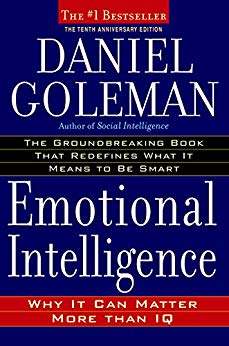

This article is an excerpt from the Shortform summary of "Emotional Intelligence" by Daniel Goleman. Shortform has the world's best summaries of books you should be reading.
Like this article? Sign up for a free trial here .
Are you emotionally self-aware? Do you know what emotions you feel, and why? Learn more about emotional self-awareness from this discussion of emotional intelligence from Daniel Goleman.
Emotional Self Awareness
Knowing your emotions is really a form of self-awareness. Self-awareness is the ability to recognize a feeling as it’s happening to you. Being able to monitor our feelings as they’re occurring helps us understand ourselves and our psychology. Failure to understand our emotional responses leaves us at their mercy. The more certain we are about our feelings, the easier it is to make personal decisions.
Even mild shifts in mood can change the way we make decisions. Making decisions in a good mood creates a perceptual bias that makes us more positive in our thinking–in other words, making decisions when you’re happy leads to happier decisions. And the opposite is true, too: making decisions when we’re in a bad mood leads to more negative thinking–you’ll make worse, more negative decisions when you’re in a worse mood.
Being emotionally self-aware of our feelings essentially means we can mentally take a step back from what we’re feeling and observe it, instead of act on it right away. Though being aware of our feelings doesn’t guarantee we can change what we’re feeling, the two usually go together. Being emotionally self-aware that you’re in a bad mood usually means you’d like to get out of it.
Don’t equate self-awareness with a “Stop that!” mentality. Balance is the goal for emotions, not suppression. All feelings have importance and value. We just want to make sure our emotions match the situation at hand, and that we can control them when they get in the way of what we want to achieve.
- When a child hits another child out of anger, yelling “Stop that!” at them might stop the action, but it won’t stop the feeling: the angry child will still be angry. Emotional self-awareness would be a response more like: “You’re hitting them out of anger. It’s okay to be angry, but it’s not okay to hit people. Why are you angry, and what else can we do about it?”
The One Good Way to Handle Emotions for Emotional Self-Awareness
There are 3 general styles for dealing with emotions:
- Self-aware. This is the preferable style of dealing with emotions. These people are aware of their moods as they happen but can be mindful about how they deal with them. They’re more sure of their boundaries since they know how they’ll feel. They tend towards a positive outlook on life since they know they can manage whatever moods are thrown at them. They don’t dwell on bad moods and can get out of ruts faster. They can be mindful of their emotions and manage them successfully.
- Engulfed. People who deal with emotions this way generally feel lost and overwhelmed inside their emotional responses. They aren’t emotionally self-aware of what’s happening to them. Their moods shift often and overpower them. They do little to change their feelings, and feel out of control often.
- Accepting. These people are more clear on what they’re feeling, but they also don’t feel like anything needs to change. Usually this category falls into two smaller categories: people who are usually in good moods, so they don’t have any motivation to change their moods, or people who are usually in bad moods but are resigned to feeling like there’s nothing they can do about it, so they might as well accept it.
The goal is to be emotionally self-aware and emotionally intelligent. But how can you tell if you fall into one of the other categories?
The book gives an example to help you figure it out. Imagine you’re on a flight. The pilot makes an announcement on the intercom that there’s turbulence ahead and everyone needs to return to their seats and fasten their seatbelts. The plane hits this turbulence and it’s the roughest you’ve ever experienced–the plane is getting tossed around like a beach ball on the waves. What do you do?
- Are you the kind of person who buries themselves in a book, magazine, or movie, tuning out the turbulence and assuming it’ll be fine?
———End of Preview———

Like what you just read? Read the rest of the world's best summary of Daniel Coleman's "Emotional Intelligence: Why It Can Matter More than IQ" at Shortform . Learn the book's critical concepts in 20 minutes or less .
Here's what you'll find in our full Emotional Intelligence summary :
- What are emotions? Why do we have them?
- What is emotional intelligence? Why is it important?
- How do you manage your own emotions? Anger, anxiety, and sadness?
- How can you approach your relationships with more emotional intelligence?
- How can you teach your children emotional intelligence?
- How can emotional intelligence boost your career?






